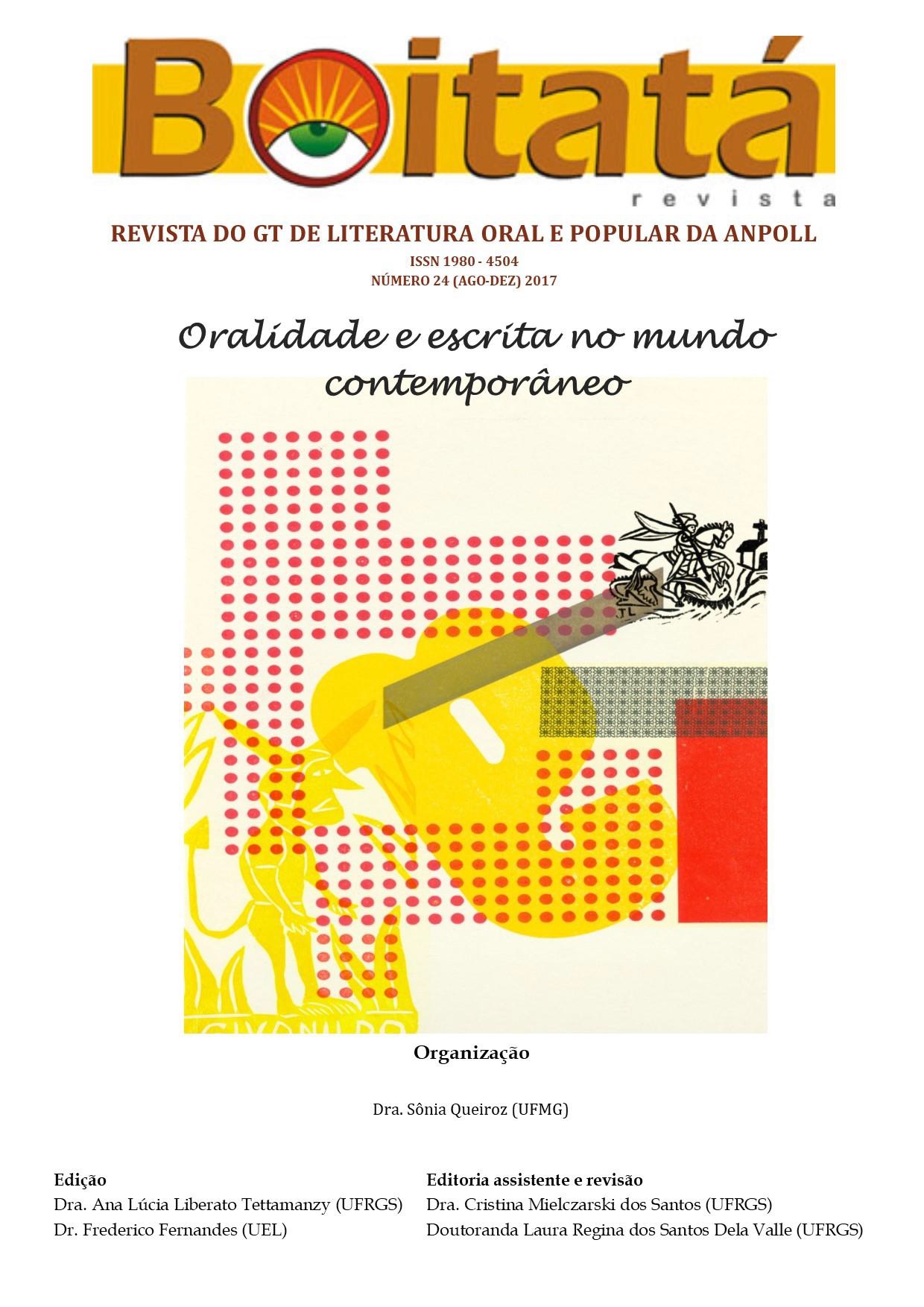The transposition of orality to literary writing in contemporaneity: Sefarad (2001) By Antonio Muñoz Molina
DOI:
https://doi.org/10.5433/boitata.2017v12.e32951Keywords:
Oral testimony, Memory, Antonio Muñoz Molina, Sefarad.Abstract
Sephardic Jews surviving Nazi persecution in France or Hungary, daughters of Communists exiles during the Spanish Civil War and the Franco dictatorship, ex-combatants from the Blue Division of the German army, exiles from the dictatorships of the former USSR or Latin America, Andalusian migrants based in Madrid, these figures anonymous, “real life” characters, become protagonists of the novel Sefarad (2001), by the writer Spanish Antonio Muñoz Molina (1956). Behaving almost as an oral historian, or as an editor of Latin American testimonio literature, the Andalusian writer transposes the oral memories to him into literary writing relied on random conversations, interviews and testimonials. Sefarad is, therefore, written literature nourished by orality. The purpose of this article is to show the process by which Muñoz Molina transforms oral memory into a source for literary writing and the stylistic resources he employs in this endeavor. In addition, we are interested in discussing which is the purpose of transposing oral testimonies to literary writing and analyzing, through the considerations metaphysical narratives, the author's ethical stance in this dynamics of appropriation and recreation of the oral testimony of the other.
References
CASAS, Ana. (Ed.). Cuadernos de narrativa: Antonio Muñoz Molina. Madri: ARCO/LIBROS S. L., 2009, p. 83-105.
BENJAMIN, Walter. O narrador. In: Obras escolhidas I: Magia e técnica, arte e política. Ensaios sobre literatura e história da cultura. Tradução de Sérgio Paulo Rouanet. 3. ed. São Paulo: Brasiliense, 1987.
DELGADO, Lucilia de A. N. História oral: memória, tempo, identidades. 2. ed. Belo Horizonte: Autêntica, 2010.
FREUD, Sigmund. Além do princípio do prazer. In: Obras completas, v. 14: História de uma neurose infantil (“O homem dos lobos”), Além do princípio do prazer e outros textos (1917 – 1920). Tradução de Paulo César de Souza. São Paulo: Cia. das Letras, 2010.
JENNY, Laurent. A estratégia da forma. Tradução de Clara C. Rocha. In: JENNY, Laurent et al. Intertextualidades. Coimbra: Almedina, 1979, p. 5-49.
MÈLICH, Joan-Carles. Disonancias (sobre ética y literatura). Ars Brevis, Barcelona, n. 17, p. 97-115, 2011.
MUÑOZ MOLINA, Antonio. Carlota Fainberg. Madri: Alfaguara, 1999.
MUÑOZ MOLINA, Antonio. El jinete polaco. Barcelona: Bibliotex S. L., 2001.
MUÑOZ MOLINA, Antonio. Sefarad. Madri: Alfaguara, 2001b.
MUÑOZ MOLINA, Antonio. Vento da lua. Tradução de Sergio Molina. São Paulo: Companhia das letras, 2009.
RICOEUR, Paul. A memória, a história, o esquecimento. Tradução de Alain François et.al. Campinas, SP: Editora da Unicamp, 2007.
SAMOYAULT, Tiphaine. A intertextualidade. Tradução de Sandra Nitrini. São Paulo: Aderaldo & Rothschild, 2008.
SELIGMANN-SILVA, Márcio. Literatura de testemunho: os limites entre a construção e a ficção. Letras, Santa Maria, RS, n. 16, p. 9-37, jun. 1998.
SELIGMANN-SILVA, Márcio. O testemunho: entre a ficção e o “real”. In: SELIGMANN-SILVA, Márcio (Org.). História, memória, literatura: o testemunho na Era das Catástrofes. Campinas, SP: Editora da Unicamp, 2003, p. 371 – 385.
SELIGMANN-SILVA, Márcio. Testemunho e a política da memória: o tempo depois das catástrofes. Projeto História, São Paulo, v. 30, p. 71-98, jun. 2005.
THOMSON, Alistair. Recompondo a memória: questões sobre a relação entre a História Oral e as memórias. Projeto História, São Paulo, v. 15, p. 51-84, abr. 1997.
ZILBERMAN, Regina. Memória entre oralidade e escrita. Letras de hoje, Porto Alegre, v. 41, n. 3, p. 117-132, set. 2006.
Downloads
Published
How to Cite
Issue
Section
License
Copyright (c) 2017 Boitatá

This work is licensed under a Creative Commons Attribution 4.0 International License.
Boitatá esta licenciada com CC BY sob essa licença é possível: Compartilhar - copiar e redistribuir o material em qualquer suporte ou formato. Adaptar - remixar, transformar, e criar a partir do material, atribuindo o devido crédito e prover um link para a licença e indicar se mudanças foram feitas.




















